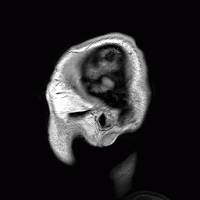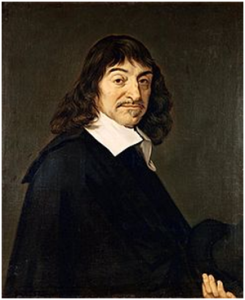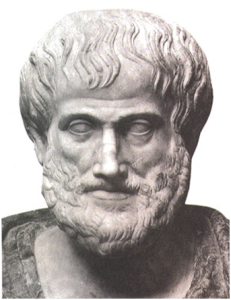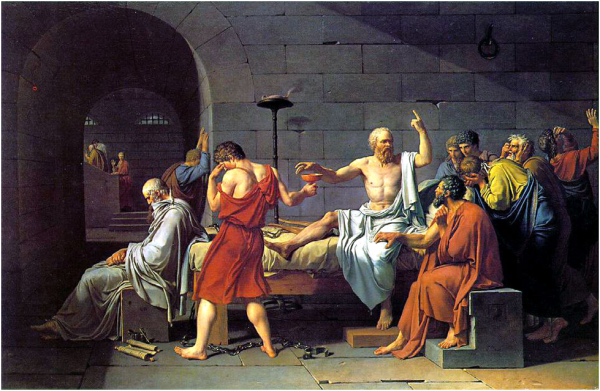What Is the Soul?
by Matthew Becklo
Filed under Anthropology
"For the world is broken, sundered, busted down the middle, self ripped from self and man pasted back together as mythical monster, half angel, half beast, but no man..."
— Walker Percy, Love in the Ruins
Last year, I found myself unexpectedly marveling at an album by Tom “It's Not Unusual” Jones, which featured covers of songs by Tom Waits, Paul Simon, and The Low Anthem. One track, "Soul of a Man," revived a bluesy 1930 song by Blind Willie Johnson that asks one my favorite philosophical questions: what is the soul?
Generally, people fall into one of the following three “camps” on the question of the soul. (Note: By soul, I mean the immaterial aspect of the human being which thinks, feels, and wills. By consciousness, I will mean something more rudimentary, but also apparently immaterial: rich subjective experience, or what philosophers call the “what it is like." This is an important distinction since people often use these words interchangeably. I’ll discuss both.)
1) Materialistic Monists (MMs) – A person is their body; the soul is reducible to the material or simply doesn’t exist.
2) Descartesian Dualists (DDs) – A person is their soul; the soul is a separable, non-material substance that inhabits the body.
3) Aristotelian Animalists (AAs) – A person is their body and their soul; the soul is the non-material form of the body, unified with the body.
 MMs have been gaining ground in recent years, especially with advances in neuroscience and the rising prominence of the New Atheists. There are different sub-groups in this camp, but in general, they all doubt that there is anything spiritual or immaterial about man. They're convinced that poetic discourse about your or my “soul” is a form of “folk psychology.”
MMs have been gaining ground in recent years, especially with advances in neuroscience and the rising prominence of the New Atheists. There are different sub-groups in this camp, but in general, they all doubt that there is anything spiritual or immaterial about man. They're convinced that poetic discourse about your or my “soul” is a form of “folk psychology.”
This view is not new, but in recent years, philosophers like Daniel Dennett have spun a far more sophisticated case with it. His 1991 book Consciousness Explained purports to show through a “multiple drafts” theory that there is no “center” of conscious experience (“I see a blue sky”), but rather a spreading of awareness “drafts” over subsystems in the brain that, through evolutionary and cultural conditioning, have resulted in an illusory unity of subjective experience.
Dennett's work suggests a question: are we gradually explaining with evolution and neuroscience what was almost always thought to be the work of divine providence? Is the soul just one more mystery-mongering domain of theologians to dispel under the hot white light of empirical science? According to Richard Dawkins, the answer is yes. “Science,” Dawkins says, “has either killed the soul or is in the process of doing so." Cognitive scientist Stephen Pinker agrees: “Cognitive neuroscience has pretty much killed [the soul]...Many kinds of evidence show that the mind is an entity in the physical world, part of a causal chain of physical events. If you send an electric current through the brain, you cause the person to have a vivid experience. If a part of the brain dies because of a blood clot or a burst artery or a bullet wound, a part of the person is gone."
But philosophers have been more or less aware of this correlation between brain states and mental states since the ancient world. (You don’t need to be Socrates to see that the mind weakens as the brain decays, or malfunctions when the head is injured.) Yet, most have gone on believing in souls, because correlation does not imply causation. To use a computer analogy, the brain might be like the hardware of your iPhone which transmits the software of Words with Friends. When you smash your phone to pieces (say, because you keep getting all vowels), Words malfunctions and vanishes with it—but your game can continue on your iPad. Similarly, after brain death, the “software” of the soul may not die with it, because it was not caused by it—only transmitted. Pinker’s evidence seems to be a textbook case of the post hoc fallacy.
Neuroplasticity research further complicates the MM's position. There is growing evidence that—in patients with OCD, for example—the brain reshapes under the tutelage of new attitudes and behaviors. But if the soul is to the brain as digestion is to the stomach, why should mental effort execute any top-down causation? In response, materialists are forced to relegate the soul—with its rationality and will—to a sort of illusory, ineffectual middle man in the brain’s modification of itself.
But the biggest problem for the MMs are qualia, or distinctive conscious experiences of things (e.g., the “what it is like” to see yellow, feel hotness, etc.). Even Sam Harris, who like Dennett is one of the leading New Atheists, has emphasized this point. In his essay “The Mystery of Consciousness,” Harris (sounding very Cartesian) says: “[T]he only thing in this universe that attests to the existence of consciousness is consciousness itself.” He concludes that “an analysis of purely physical processes will never yield a picture of consciousness.” Harris indirectly cites the work of two philosophers leading this charge against the MMs: Thomas Nagel ("What Is It Like to Be a Bat?") and David Chalmers (the “hard problem” of consciousness), who are also both atheists. The work of these three eminent, non-religious thinkers yields an inconvenient truth: that the richness of subjective consciousness will not be subdued by materialism, not because the empirical tools of science have yet to advance on it, but because it is inescapably “stuff” of a different order. As Nagel puts it in his latest book Mind and Cosmos, “The existence of consciousness seems to imply that...the natural order is far less austere than it would be if physics and chemistry accounted for everything.”
The irreducibility of consciousness to physics and chemistry seems to push us toward dualism and the DDs: perhaps consciousness is the bulwark of something like the soul, demanding that we acknowledge it?
 The notion of dualism stretches back to Plato's Phaedo (360 B.C.) and beyond; but French philosopher and mathematician Descartes, at the birth of modern science, incorporated Platonic dualism into a systematic division of the world between the res extensa (extended thing) and res cogitans (thinking thing). For him, the only thing one could prove existed beyond the shadow of a doubt was the thinking subject. As he famously put it: “I am only a thing that thinks” (which sounds a lot like Johnson’s line, “a man ain't nothing but his mind”).
The notion of dualism stretches back to Plato's Phaedo (360 B.C.) and beyond; but French philosopher and mathematician Descartes, at the birth of modern science, incorporated Platonic dualism into a systematic division of the world between the res extensa (extended thing) and res cogitans (thinking thing). For him, the only thing one could prove existed beyond the shadow of a doubt was the thinking subject. As he famously put it: “I am only a thing that thinks” (which sounds a lot like Johnson’s line, “a man ain't nothing but his mind”).
Many Christian movements (e.g., Gnosticism, and later Puritanism) have been made up of committed DDs. In fact, De Tocqueville once remarked that Protestant America is “where the precepts of Descartes are best applied.” Religious DDs tend to speak of the soul and “the flesh” as one speaks of a prisoner and a jail, and to conceive of everlasting life with God in wholly spiritual terms.
But the trouble for all DDs, religious or not, are legion. The first and greatest is the snare of skepticism. In the DDs framework, where the person is reducible to his or her immaterial self, it seem inescapable that we’re doomed to doubt everything – the existence of other minds (philosophical zombies), the external world (world-as-computer simulation), even our own bodies (brain in a vat). Only philosophers like Chalmers are crazy enough to think about these things—common sense flies in the face of all three—but the problems remain.
Another problem is the relationship between soul and body. How does the immaterial soul or self “operate” the material body? When I decide to raise my arm, and I do it, where is the link between my immaterial thought and my material action? (Descartes’ guess was the pineal gland, which scientists have since deemed an endocrine organ.) DDs are stuck with the Cartesian catastrophe of the “ghost in the machine,” an incoherency that effects oscillation between the two extremes to this day (what novelist Walker Percy, inspired by Jacques Maritain, termed “angelism-beastilism”).
(In an effort to avoid these and other problems presented by dualism, philosophers like Nagel are increasingly considering a sort of Emersonian view called panpsychism, the belief that consciousness pervades all of reality, that it’s “awareness all the way down.” This view may have some explanatory power, but there are glaring difficulties: how could a mini-consciousness, which is simple and indivisible, inhere in the elementary particles which constitute the physical world? And how do the mental aspects of these infinite particles, which constitute even our brain, combine into our one consciousness?)
A third position, which avoids the pitfalls of both materialism and dualism, is that of the Aristotelian Animalists (AAs).
 Aristotle wrote in De Anima that the soul is: “(a) the source or origin of movement, it is (b) the end, it is (c) the essence of the whole living body.” For Aristotle, there are different kinds of souls (plant, animal, and human) with varying degrees of biological and cognitive activity. The human soul is the animating form of the matter of the human animal, the actuating “breath” of what a body is and does. Aristotle thus distinguishes the soul from the material body, but not as a ghost from a machine. Unlike Plato, Aristotle concluded that the soul is “inseparable from its body,” although the highest faculty of the soul—the mind—is “immortal and eternal.”
Aristotle wrote in De Anima that the soul is: “(a) the source or origin of movement, it is (b) the end, it is (c) the essence of the whole living body.” For Aristotle, there are different kinds of souls (plant, animal, and human) with varying degrees of biological and cognitive activity. The human soul is the animating form of the matter of the human animal, the actuating “breath” of what a body is and does. Aristotle thus distinguishes the soul from the material body, but not as a ghost from a machine. Unlike Plato, Aristotle concluded that the soul is “inseparable from its body,” although the highest faculty of the soul—the mind—is “immortal and eternal.”
Aristotle's earthy notion of the soul was picked up by scholastic philosophers, most notably Thomas Aquinas. In his Summa Theologica, Aquinas agreed with Aristotle that “it belongs to the notion of a soul to be the form of a body,” and that although a human soul’s rationality points to its subsistence after death, the disembodied soul is a form without matter, and therefore incomplete. Death does not result in the final liberation and fulfillment of the soul, but a dislodging of the body’s essence, our being “not wholly at rest.”
Thomism, informed by this Aristotelian view of the person, has held to this unity of body and soul and fought fiercely against the two alternatives. As one Notre Dame philosopher puts it, the Thomistic view is that “dualism is just as wrongheaded and, in the end, just as pernicious as physicalism.” Why pernicious?
Because dualism “has the dire moral consequence of leaving the body bereft of more than merely external or instrumental moral significance.” Materialism, on the other hand, leaves the apparent “limitlessness and lucidity” of our freedom and rationality bereft of much significance at all. AAs, in contrast, account for the whole person—thought, freedom, will, as well as qualia—a philosophical account which has informed and paralleled Catholic theology (e.g., the sacraments, the resurrection of the dead, and the theology of the body). As the Catechism states it: “spirit and matter, in man, are not two natures united, but rather their union forms a single nature.”
The position of the AAs seems to be the most coherent and plausible of these three camps, since it leaves us with the fewest problems and has the most explanatory power. Still, asking about the soul and answering it in philosophical terms is one thing. Hearing the question sung from the pit of a soul is another. I have to answer, after everything, “a mystery.”
Based on article originally posted at By Way of Beauty. Used with permission.
Related Posts
Note: Our goal is to cultivate serious and respectful dialogue. While it's OK to disagree—even encouraged!—any snarky, offensive, or off-topic comments will be deleted. Before commenting please read the Commenting Rules and Tips. If you're having trouble commenting, read the Commenting Instructions.













